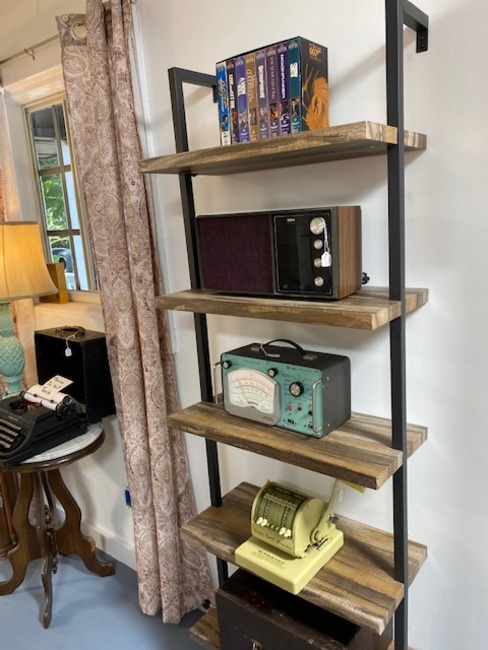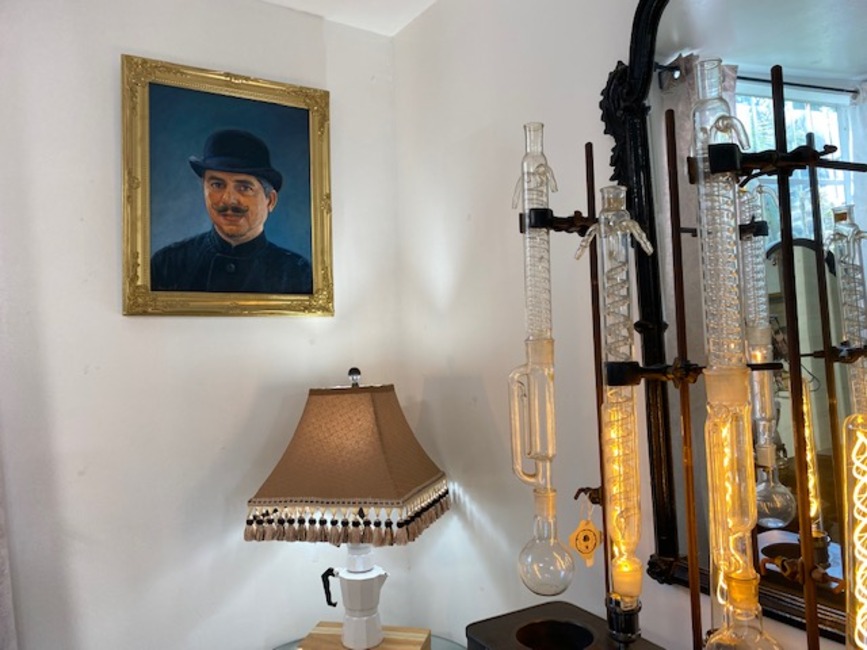Nestled between the mangroves of an eclectic hub of shops formed out of an old
railroad town where peacocks croon lies a store in which Jaime “Jimmy” Cordovez
sells his wares. Unlike most businesses in South Florida, his can be best described as a
time-capsule uniting old and young alike.
Located inside a rustic cottage, remixes of 1920’s jazz plays outside to draw in customers. There, they will find vintage cameras, typewriters, and even a record player from the
early 1900’s that still works.
Yet, the biggest draw to the place is how bright it is.
“I’ve always wanted to be an artist,” said Cordovez. “I just didn’t know which direction or
which way I was going to be an artist. I tried painting and drawing, and it just wasn’t
enough. Like I needed something more creative.”
While sunlight filters through the windows, every nook and cranny of the store is
illuminated with light fixtures made out of the vintage items that permeate the room.
From a lamp that uses a broken typewriter as its base to a chandelier made out of
baking whisks, Cordovez has made an art out of repurposing.
But of course, all artists must start somewhere. Cordovez was born and raised in
Miami in the year 1976. He moved around the area’s numerous neighborhoods, from
Eighth Street to Miami Beach to Westchester until finally, he settled in Kendall.
“I’ve always heard that Cubans had that talent of repurposing because of how Cuba is,”
Cordovez said, remembering his childhood. “So I kind of used that idea that I could do it
as well. I was born and raised here with Cuban parents, my grandfather was a bit of an
inventor as well, very creative. I guess it’s in the genes.”
Art was always in the Cordovez blood. It all started with his grandfather, who was an
artist at heart. He would paint and invent new board games to play at the house, yet by
day he was a sign painter. This same line of work passed on to Cordovez’s father.
When it came time to find a career, however, Cordovez took a different route. He
studied at ITT Technical Institute for graphic design. While he enjoyed creating logos,
eventually the work became too repetitive.
“I can’t sit there and do things over and over again — that’s why I stopped doing it,”
Cordovez said. “I couldn’t stand sitting in front of a computer all day. I needed to work
with my hands, I needed to do something a little more different.”
“One day I needed a lamp for my own house, and my room didn’t have any light fixtures
whatsoever,” he said. “So, I came up with this bird cage lamp and I started researching
and I was like ‘wait a minute, this is pretty easy to do and cheap.”
After doing research and finding many other artistic lamps online selling for hundreds of
dollars, he realized that he could actually do this. Not only was it profitable, but it
was also fun and exciting!
For ten years him and his wife, Jacinta “Jaz” Cordovez, traveled to many art events to
showcase his works. As his notoriety grew, Cordovez set his sights to opening up shop
within Cauley Square, an old railroad town turned rustic shopping area nestled in the
Redlands of South Florida.
While many thought it was crazy to open a business during the pandemic, Jimmy’s Bright Ideas opened its doors in 2021. Even though it is still a work in progress, customers are captivated when they enter the store, finding themselves in what seems like a time capsule.
“My favorite part is watching their facial expressions,” Cordovez said. “Like they’re eyes open up and they’re like ‘woah wow!’ you know and they’re like ‘what is this?’ and now they’re in a toy store — and these are grown adults.”

The museum-like quality of the store draws customers in through a love of nostalgia.
But once they start to notice the unique lamps around the store, they quickly realize that
Cordovez has made an art of repurposing.
“You cannot really teach someone how to repurpose when every object has its own
different way of doing it,” Cordovez said. “That’s what I like about it — I like the challenge. Because there is no one way of making something.”
Working with antiques especially can make any person uneasy as the thought of
damaging an item can make it lose its value. But when it comes to Cordovez’s art, it’s not
about making something that is flawless or new. Rather, it’s about taking something old
and giving it new life.
“This is what I like about using used objects,” Cordovez said. “Because sometimes I might
scratch it or scrape it or drill it wrong. And when you have something that’s really been
used and abused, it doesn’t matter if you scratch it or do some mistake. You can just
figure out a way to cover it up — or just leave it alone and it just adds character to it!”
“What I like about this business is that I keep stuff out of the garbage,” Cordovez
continued. “A lot of people throw stuff away these days, things break and that’s it – it’s
gone. So, I feel that by grabbing something that’s broken that could end up in the
garbage and giving it a new use that becomes art and becomes useful again.”
From children’s instruments to an old Cuban radio from the 1970’s, Cordovez can turn a
physical reminder of the past and bring some life back into it with a flick of a switch.
However, having a space to home these art pieces allows for the collaboration of other
small, local artists in the area.
Ozzy Deschapel, owner of Smashing Pen Company, creates resin pens of all colors, as
if they were made of stained glass. He discovered Cordovez’s eclectic store after he took
his family to visit the Cauley Square Tea House.
Before selling his pens at Cordovez’s store, Deschapel mostly made profit from
Instagram sales and word-of-mouth. Despite many people claiming that social media
has benefited small businesses, the reality, according to Deschapel, is a lot harder than
it seems.
“The problem with social media is that it is very high maintenance.” “You have a lot of
interacting with people that are not really committed to spending money and might not
be willing to commit to a sale. So you waste a lot of time.”
“People might be reluctant to pay what it’s really worth,” Deschapel said, regarding the
benefits of selling at a physical store. “But if a person can see it inside a store or in an
art exhibit or something like that and pick it up, that’s a big help — especially if it’s
something like a writing instrument, a pen. To be able to grab and sort of hold it in your
hand, that’s what sells a lot of people on it.”
Now that he has been selling some of his resin pens at Cordovez’s store, Deschapel is
excited to see how far this collaboration can go. He hopes to be able to rent a corner in
the store, which would allow him to expand his artistic portfolio to include wooden
pieces made from recycled driftwood inspired by what he has learned from the South
Florida Woodturner’s Guild.
“I think what he’s doing down there in his shop is awesome,” Deschapel said. “If you’re
a maker or craftsperson, and you’re trying to do something that you enjoy doing, and
you want to get it out there, it’s great to have a person that’s willing to display your stuff
like that.”
Although he creates many different types of lamps from vintage items, he has only kept three of his creations. One is a chandelier made of driftwood that hangs from his dining room table. Another is a cigar box lamp he created for his grandmother, and later kept when she passed as a way to remember her.

Finally, he still has the bird-cage lamp that started it all ten years ago.
“With a little hard work, anyone can make their dreams come true.” Cordovez stated. “This is my dream work, my dream job. It’s still a process, but as long as you just keep
forward, keep doing it, you’ll reach your goal. Just let your heart guide you, and don’t be
afraid. And have faith.”

































